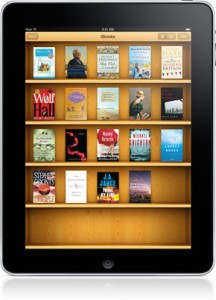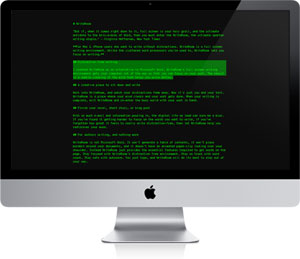Despite all the iPad hype, very quietly, Jobs has done it again. When it comes to writers, we have much to be thankful for regarding Apple CEO Steven P. Jobs. Famously, his vision and ability to identify quality enabled him to observe computer interface developments created at Xerox PARC. He built his own, superior version of it called the Lisa. Most of us came to know the technology behind the Lisa as the Macintosh, 1984’s miracle of computing interface. The 128k original Mac allowed writers, among countless others, to move words around effortlessly, and without penalty. Compared to MS-DOS—or anything else out there, for that matter—point and click with a mouse, the magic trio of copy, cut and paste and proportionally-spaced typefaces were lightyears beyond what computer engineers were dreaming of for endusers.
By recognizing the value of Adobe’s PostScript technology, writers were blessed once again when Apple introduced the LaserWriter. By building the LaserWriter to provide professional-looking output, Jobs gave countless writers (and designers) more work. This was text without jagged edges. Throw in a copy of Aldus PageMaker and for about ten thousand dollars, you could own a turnkey system which replaced typesetting systems costing deep into the six-figures. Suddenly, businesses everywhere created in-house newsletters. Someone had to generate the stories which filled those pages. Authors could produce better-looking hardcopy than they previously could on their ImageWriter printers, and often, better than newspapers.
There’s countless other things writers should thank the Great Jobs for. They include, but are not limited to, painless and reliable built-in networking, painless and reliable plug-in peripherals, true multitasking operating systems with protected memory, an all-around spiffy user interface, object oriented programming, the first stock email application, the death of the diskette, and more.

©2010 Apple Inc.
Since this is about writers, I’ll try to stick to just an additional few which are apropos. The iTunes Music Store is typically associated with consumers cherry picking songs they want, when they were previously shackled to buying entire albums, and often bad albums, at that. What you don’t hear much is how the iTunes Music Store helped align the audio book industry with consumer expectation. Most individuals I know who didn’t want to read found it absurd to have to buy an eight or ten audio CD set of a novel and pay $40 or more dollars for it. Who wants to fumble through eight CDs while you’re trying to avoid tractor trailers and road hazards on our decaying interstate highway system? Thanks to the Great and Powerful Jobs, not only did the price become more reasonable (and, yes, I state this as a consumer, an author, and a publisher), but by doing away with CDs, we’re saving space, slowing our inevitable destruction of the natural world just a tad, and preventing some accidents on the highway.
We’ve rarely seen the amount of speculation, hype, and insanity surrounding a consumer electronics product as we’ve seen around the iPad. With most pundits having never held one in their hands, there’s endless prognostications about how many Apple will sell or fail to sell, and what it will do. Most technology companies fantasize about consumer expectation the iPad generated before the public even knew what it would look like. Now that we have a reasonable understanding of the device before it ships, Apple has quietly announced something that will shake the publishing industry to its progressively multinational conglomerate core. If you live and/or work in Manhattan, be wary of using sidewalks for fear of senior editors and upper-level managerial types flinging themselves from windows.
The Great Jobs has done it again. He’s changed the world once more through an ingenious, yet obvious way which should’ve been normal, business-as-usual consumer patterns since the dawn of the Internet era. With the advent of the Gutenberg press, publishers of all kinds have had two things which kept authors relatively powerless and in a hostage-like position: physical media and its distribution.
Apple is about to change all that. As reported by AppleInsider, self-publishing authors can now get their creations into the hands of millions, thanks to Jobs, the iPad, and Apple’s iBookstore. The owners of LuLu and other print on demand solutions are drinking heavily, writing final notes, and loading handguns as I write this. If trees knew what was going on, they’d be sucking in carbon dioxide with great relief.
Allegedly, part of Apple’s stipulation on self-published offerings at the iBookstore is they must carry ISBN numbers. Our old friends at R.R. Bowker, the ISBN Agency in the United States responsible for assigning ISBNs, are rubbing their hands together and breaking out champagne. Way to go, Bowker! Ivy League tuition reimbursement for all employees’ offspring!
Amazon and Barnes and Noble have tried this. How many self-published breakout authors utilizing either one of these solutions can we name? How many writers do you know crowing about how many Kindle sales they’ve made with their self-published novels? When you type “self-publish” into the search field at B&N.com, you get sales choices, not information on how to self-publish with them. Len Riggio and his Walmart-like henchmen have famously long-struggled with Internet strategies, and, after arriving late to the party, have continually failed to make up for lost time.
Apple stands poised to show them how to do this right. The core strength of Apple has always been brilliant software with slick and intrinsic user interfaces. There’s no reason to believe self-publishing on the iBookstore will be any different.
As with previous revolutions kicked off by Jobs, the intelligent among us already know what will happen. When Apple democratizes previously financially unreachable technologies for the masses, the barbarians storm the castle, along with a lot of respectable content makers. Eventually, all things rise or fall to their level of incompetence. Dreck will pass largely ignored, except in rare cases of a self-published ebook going viral because of scandal, timely ridiculousness, or insanity.
On the other hand, quality will rise to the top. Well-written, professionally edited fiction, nonfiction, poetry, and other generes will gain precious exposure, organic public relations buzz, and ultimately, sales. This will happen in ways and via venues we can’t yet imagine. If anyone told AOL members in 1991 that an idea to sell used Pez dispensers online would create many millionaires, they’d have laughed and gone back to being hypnotized by the tones coming from their dial-up modems.
What’s more, careers will be created, and they won’t be created by multinational publishing concerns. Individuals and small startups will create jobs in the new publishing landscape where the heathen have entered the cathedrals swinging their badly-written and non-edited electronic manuscripts. Every spring our nation is awash in a fresh crop of MFA, MA, and, yes, Ph.D. graduates. Largely, these indebted youth wind up working unhappily in fields they were not trained in. Some of them will see this new opportunity to wind up making their own hours, sitting at home naked and writing reviews of a fortunate small percentage of titles riding in on the never-ending tsunami of self-published e-books.
There will always be a need for publishing companies. Customers know a decent publisher will provide quality products showcasing good editing, error-free copy, and a well-conceived cover and backcover, with blurbs by trusted, established authors and critics. If you doubt that, look at quality online publications like Slate, The New York Times, and The New Yorker, among others. Great reporting, carefully edited and fact-checked, will draw more readers than a poorly written screed blasted out by some yahoo who doesn’t know the difference between “your” and “you’re.”
Large publishing concerns are threatened, and they should be. They’ve had it too easy by controlling the physical media and its distribution. They will not be able to act like North Korea and assume or hope isolation will carry them through. Newspapers have already learned this lesson in spades. Unlike the days of analog information, data propagates, and does so at very little cost, especially via social media.
Apple, the iPad, and the Great and Powerful Jobs are going to change publishing. If you think Amazon, publishing on demand, Kindle, and used books available over the Internet gave readers more choices, that was just a drop in the ocean. Every bad idea for a novel by writers who haven’t read much will now have no excuse to not spend their evenings cranking out their unreadable tomes. The unending fantasy they will be able to quit their day jobs, write for a living, and be anointed by Oprah is now closer than ever.

Just some of the voting my dollars have done.
Publishing companies are not doomed if they stay nimble and progressive. That means the old ways of doing business will not apply as they once did. New publishers will arise from the inevitable gold rush and currently unrealized opportunities. I have many of thoughts on this, including notes from consulting gigs I’ve already undertaken for traditional publishers. Some have found their way into essays I may or may not post on The Egatz Epitaph, depending on feedback. I’m a writer and publisher, but I’m also a reader and consumer. I will vote with my dollars, as I’ve done buying dead tree books my whole life. Quality discoveries will still be waiting for editors in the slush pile. Good writing will out. Thanks, Steve. To borrow your phrase, the world is a better place.
 If you’re doubting the way consumers are pushing the publishing industry, witness the numbers released by Apple. In just a few days since the release of the iPad, the facts are:
If you’re doubting the way consumers are pushing the publishing industry, witness the numbers released by Apple. In just a few days since the release of the iPad, the facts are:







